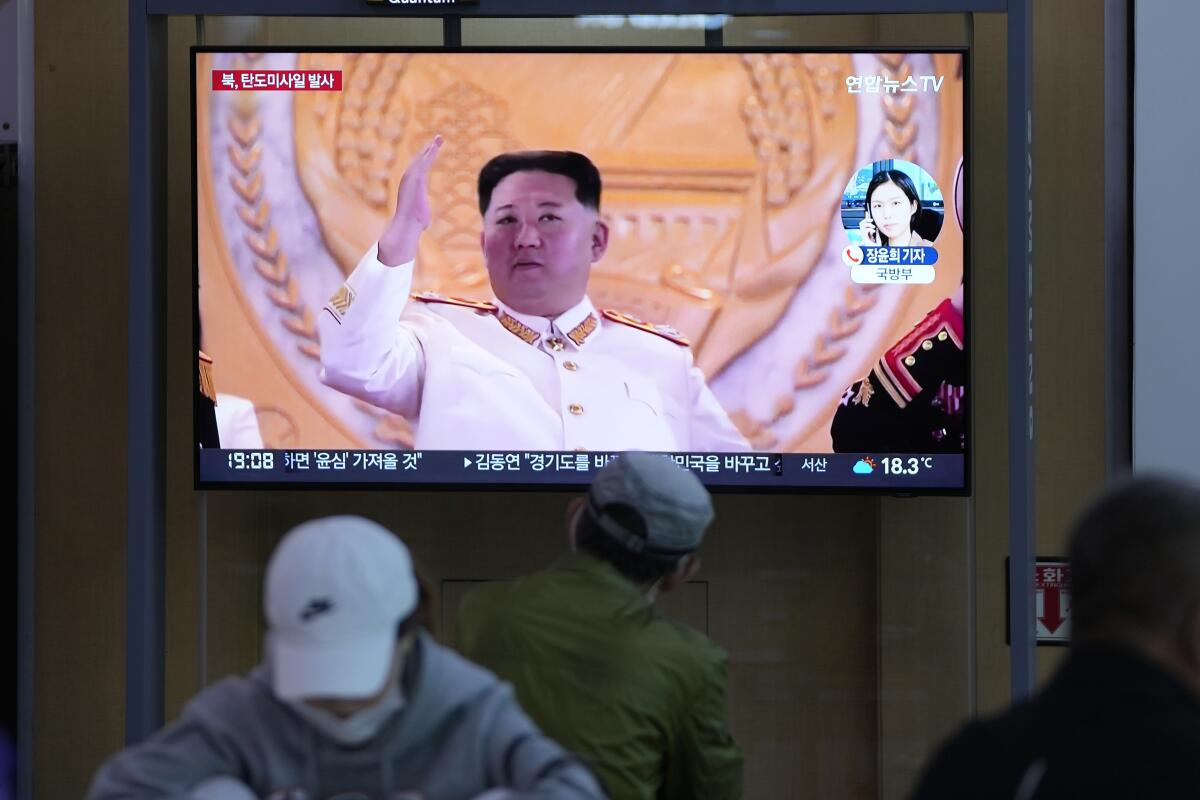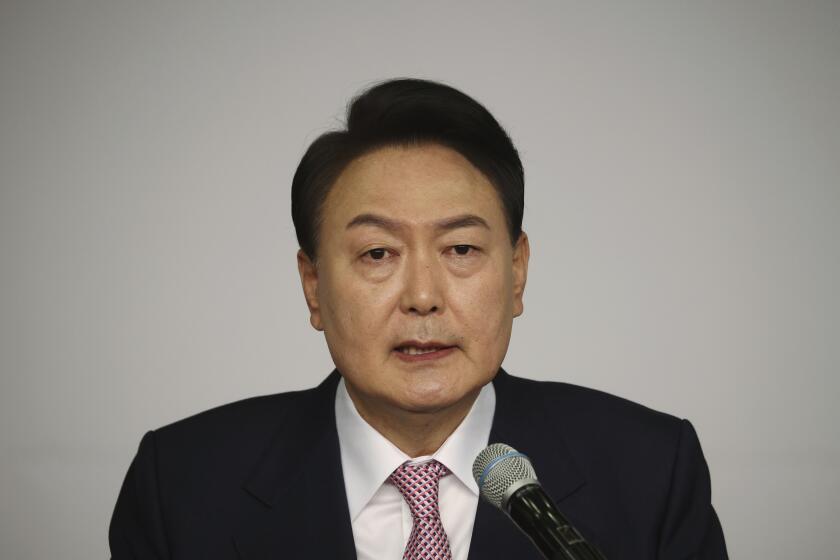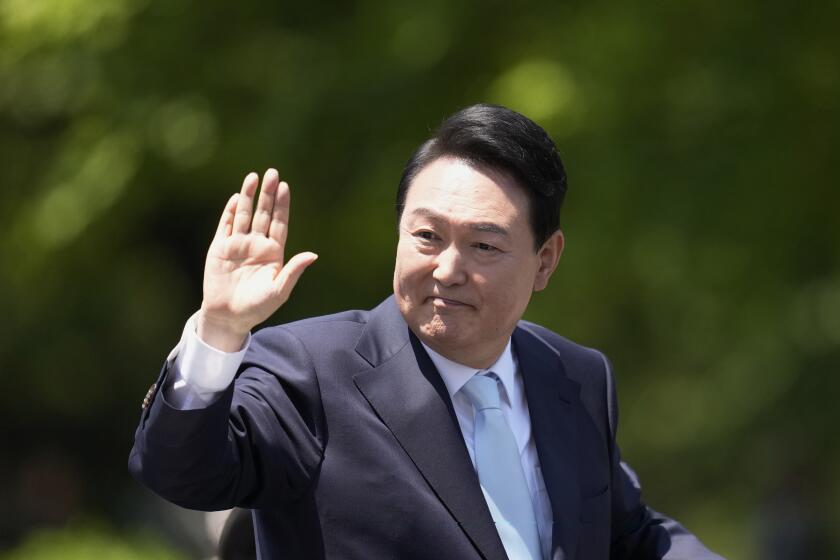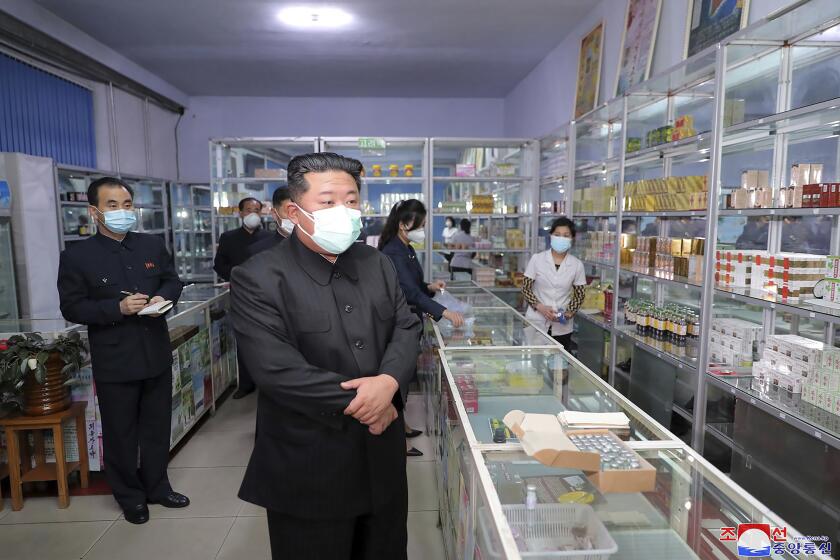Op-Ed: When will our North Korea policy get real? Kim Jong Un won’t denuclearize

President Biden travels to South Korea and Japan this week for bilateral meetings with two of Washington’s closest allies in Asia. White House officials have stressed that North Korea’s nuclear and missile program will be a major topic of discussion. If the U.S. doesn’t use the visit to kick-start a more level-headed strategy on North Korea, it will be a missed opportunity.
In Seoul, Biden will confront a nation under new management. Yoon Suk-yeol, a political novice who won the South Korean presidential election by less than a percentage point, has very different ideas about North Korea than his predecessor Moon Jae-in, who staked his political legacy on inter-Korean reconciliation. Despite three summits with Kim Jong Un and a warm rapport that stretched to the very end of Moon’s tenure, that reconciliation never happened.
Yoon is primed for an altogether different strategy toward the North, a combination of tough talk, the ratcheting up of international sanctions and the resumption of large-scale military exercises with Washington. While Yoon isn’t adverse to dialogue — he expressed a willingness to keep the door to talks open during his May 10 inauguration address — he is opposed to granting Pyongyang any economic relief until after the North Koreans demonstrate tangible steps toward denuclearization.
Yoon Suk Yeol says he would solidify an alliance with the U.S., build up a powerful military and deal sternly with North Korean provocations.
Biden’s visit comes as North Korea is in the middle of an aggressive missile testing schedule. The Kim dynasty has conducted 16 missile tests so far this year, the latest a May 12 volley of three short-range ballistic missiles. In March, Kim Jong Un tested North Korea’s first intercontinental ballistic missile in four years, breaking an April 2018 self-imposed moratorium. The U.S. intelligence community has suggested another ICBM test may happen while Biden is in Asia and has also detected activity at the North’s Punggye-ri test facility — North Korea’s first nuclear test since September 2017 could happen as soon as this month.
To date, the Biden administration’s strategy on the North could best be described as splitting the difference between the Obama administration’s “strategic patience” and the Trump administration’s top-down diplomacy: U.S. officials have aggressively condemned Pyongyang for violations of U.N. Security Council resolutions, which prohibit North Korean ballistic missile tests, and have adopted additional sanctions. At the same time, Washington insists it is willing to engage in diplomacy with the North without preconditions. North Korea, however, continues to develop its missiles, and nuclear diplomacy between Washington and Pyongyang is as distant today as it was when Biden first took the oath of office.
As difficult as it is, the U.S. needs to acknowledge that its current approach is insufficient to the task at hand: reducing tension on the Korean Peninsula, where nearly 30,000 U.S. troops are located.
New President Yoon Suk-yeol , a political neophyte, vows to present an ‘audacious plan’ to improve North Korea’s economy if it denuclearizes.
Reciting the usual talking points about denuclearization will do nothing to stop North Korea from sending more missiles into the sky. Instead of talking in generalities, the Biden administration needs to put a clear, thought-out proposal on the table. Such a proposal should detail precisely what the U.S. is looking to achieve, what economic, political and security incentives the U.S. can offer North Korea if it cooperates in negotiations, and how the U.S. envisions its relationship with North Korea over the long term.
However, no diplomacy with the North will succeed unless the U.S. is more realistic about its objectives. Like every administration before it, the Biden administration is focusing on a completely denuclearized North Korea. But pressuring or enticing North Korea to eliminate its nuclear weapons program to the root is clearly a hopeless task.
If such a feat ever had a chance, it was in the early 1990s, when North Korea was still trying to master the nuclear fuel cycle. Today, with the North possessing enough fissile nuclear material for as many as 60 warheads, denuclearization (especially on Washington’s timetable) is no longer feasible. No other country that has developed an indigenous nuclear weapons stockpile has agreed to trade all of it away for concessions. There is no reason to believe that North Korea, whose external security is guaranteed as long as it retains an operational nuclear weapons program, will be the first.
North Korean leader blasts officials over slow medicine deliveries and orders military to help in the nation’s COVID-19 crisis.
Denuclearization isn’t the only way forward, however. Kim Jong Un won’t part with his nuclear warheads, but he may be willing to cap any further nuclear tests or missile launches in exchange for concrete economic rewards.
This is hardly an innovative idea; in February 2012, the Obama administration agreed to send 240,000 tons of U.S. food aid in exchange for a North Korean missile and nuclear test moratorium. That deal quickly collapsed, but it did so because the U.S. and North Korea never agreed on the exact terms of a missile moratorium (for instance, were space launches included in the ban?), and Washington was reluctant to go through the laborious exercise of producing a joint document with the North. Let this be a lesson to Washington: Any arrangements with Pyongyang must be written down to prevent different interpretations from dooming the effort.
Denouncing North Korea for violations of international law will only get you so far. But pragmatic diplomacy with realistic goals could set the stage for a more predictable, stable environment in one of the world’s most militarized regions.
Daniel R. DePetris is a fellow at Defense Priorities and a foreign affairs columnist at Newsweek.
More to Read
A cure for the common opinion
Get thought-provoking perspectives with our weekly newsletter.
You may occasionally receive promotional content from the Los Angeles Times.













